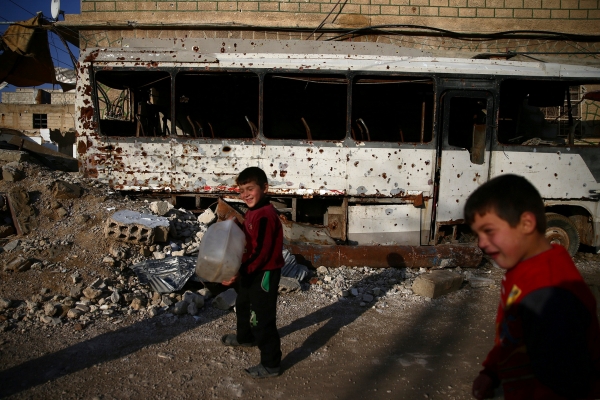The current failure in Syria is saddening and its future repercussions are dangerous. All of this comes amid the Saudi-Qatari disagreement, two partner countries in supporting the Syrian people in the face of massacres of the Syrian regime and its allies.
The truth is that Syria is one of the reasons behind this disagreement and while Saudi Arabia supported Syrian national parties like Free Syrian Army, Qatar chose to back armed groups internationally listed as a terrorist. This is part of what Qatar does in other war zones around the world like Libya.
Conflicts between Riyadh and Doha began early in Syria, but it was a silent crisis. Both countries were convinced stability in Syria and the region is not possible with the presence of the decaying Bashar al-Assad regime and surely not after the horrific crimes against civilians.
Above all that, Assad consolidated Iran’s military control in his country which threatens the regional security of other countries such as the Gulf, Iraq, and Turkey.
The regime destroyed cities and displaced civilians, while the world feared Syria would turn into a terrorist hub. Yet, Qatar continued its support for ISIS, al-Nusra Front, and Ahrar al-Sham.
Meanwhile, Saudi’s primary choice was to back the Free Syrian Army.
The dispute between the two countries of the Gulf escalated to include managing the opposition within the coalition committee, while Qatari ISIS and Nusra were fighting Saudi Free Army in the fields and looting liberated areas.
Clashes revealed the real intentions of Qatar which were hiding behind the coalition.
There’s more to it than one’s eye meet!
The truth is Saudi Arabia fears Qatar’s intentions because it is keen on attracting and supporting “jihadists”, especially Saudis.
Since Doha coup during the 1990’s, Riyadh has been suspecting that Hamad bin Khalifa’s government is targeting the Kingdom by supporting its opposers financially and in the media, including al-Qaeda former leader Osama bin Laden.
Bin Laden was calling for toppling the Saudi regime from Qatar’s broadcasting channels.
After the US invasion in Iraq, Qatar played a dangerous role in funding the so-called resistance, especially foreign fighters who include Saudis. They would gather in Syria and be sent along with other foreign fighters to revolting Iraqi governorates such as al-Anbar.
That happened during the coalition of Hamad and Assad’s regimes for almost ten years in Lebanon, Iraq, and Gaza. They fell out a year before the Arab Spring revolutions.
During the Syrian revolution, Saudi suspicions rose again where Qatar continued to support Saudi fighters when it adopted terrorist organizations like al-Nusra which was blacklisted by Saudi Arabia.
Saudi Ministry of Interior Affairs issued public alerts warning citizens of engaging in the Syrian war and asked Turkey to prevent their passage through its territories.
Prominent Saudi fugitive Abulallah al-Muhaisini is from a wealthy family, like Bin Laden, and was supported by Qatar while it funded terrorist Nusra Front. He escaped to Syria in 2013 in defiance to Saudi ban. Qatar has looked after him as part of its funding of the terrorist al-Nusra Front.
It might seem contradicting that Saudis support the Syrian revolution, from one point, and at the same time oppose the support foreign fighters receive. It actually opposes this support because of its repercussions on it.
Riyadh was against foreign fighters in Afghanistan after the Soviet Union left the country, and opposed them during the Bosnian, Somalia and Iraqi wars.
Syria’s war was a terrorist nightmare. It includes Iran and its militias in addition to ISIS and its branches.
Iran’s dominance over Syria and slaughtering of Syrian people is not acceptable for Riyadh.
Whereas Qatar considers Syria just another arena to raise its ferocious animals of extremist movements. Doha considers extremist Islamists the winning card, thinking it can use it in Egypt, Libya, Tunisia and of course Syria.
By favoring extremists, Qatar destroyed the region. Just like it did with Muslim Brotherhood in Egypt, extreme groups in Libya and Syria, and its implication of Sunnis in Iraq.
Doha’s extremists damaged the Syria revolution more than Assad troops and Iranian militias did. It also tarnished the image of Syrian people and destroyed their dreams in revolting against tyranny.
Qatar imported groups that believe in slaughtering, captivity, and permit shedding their blood.
In the beginning, we thought there was some sort of Saudi paranoia from Qatar and that Riyadh is overreacting. But Doha’s repetitive practices and its strange determination and insistence on supporting extremist proved that this is a policy and not just reactions or imaginations.
